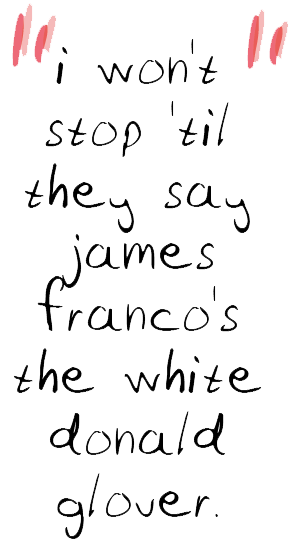Donald Glover is like a human Swiss army knife — he’s known for being multi-talented. But it’s Glover’s skill on the microphone that really deserves attention. Glover, who raps under the moniker Childish Gambino, is responsible for creating some of the most provocative social commentary available today, combining an awareness of himself and society with deft skills in writing verses and producing tracks.
While most rappers tend to shy away from topics that make them look soft, nothing is off limits for Gambino, whose subjects range from his difficult childhood to his chronic depression to his noted taste in women and clothes. All are delivered with a confidence that allows him to poke fun at himself, something that few rappers are willing to do.
The combination of self-aggrandizement and self-deprecation that permeates Gambino’s work reflects the conflicted feelings that most rappers and, for that matter, people, likely experience but are reluctant to share with others. His honesty in the hip-hop game is a refreshing change of pace after generations of artists who build themselves up with insubstantial claims of greatness and little evidence to prove it.
 Gambino does have the rags-to-riches story, an unspoken prerequisite to entering the rap game, but his experiences growing up in Georgia and attending NYU lend him a unique perspective on race and prejudice. As a black kid growing up in predominantly white communities, Gambino encountered many instances in which others’ expectations of him differed from how he wanted to live his life. He channels these ideas into songs like “Hold You Down,” which features brilliant commentary on the evolution of racism.
Gambino does have the rags-to-riches story, an unspoken prerequisite to entering the rap game, but his experiences growing up in Georgia and attending NYU lend him a unique perspective on race and prejudice. As a black kid growing up in predominantly white communities, Gambino encountered many instances in which others’ expectations of him differed from how he wanted to live his life. He channels these ideas into songs like “Hold You Down,” which features brilliant commentary on the evolution of racism.
While Gambino gained more popularity following the release of his 2011 major label debut album “Camp,” his first mixtape, “Sick Boi,” was released in 2008. Other early efforts, like “EP” and “I AM JUST A RAPPER” parts one and two, established his creativity with words and rhythm but progressed into more introspective territory. The latter two tapes featured Gambino rapping over songs from bands like St. Vincent and Sleigh Bells, and they created an innovative and infectious blend of hip-hop and indie music that perfectly represented the artist.
His lyrical mastery is unparalleled in the game today, and one only need listen to the opening verse of “All That Power,” Gambino’s favorite lyrics, for proof. It’s incredible that an artist who has struggled so much with being accepted into the hip-hop community is the same one who chooses to make it more accessible to others. He broadens the genre to include various aspects of black culture that go unnoticed or are deliberately ignored. Considering his burgeoning film career, it may be awhile before we see Glover’s alter ego make another appearance, but it’s worth waiting for the artist who opened the rap community to those who felt alienated before.
— Alexandria Ethridge






















































































































































